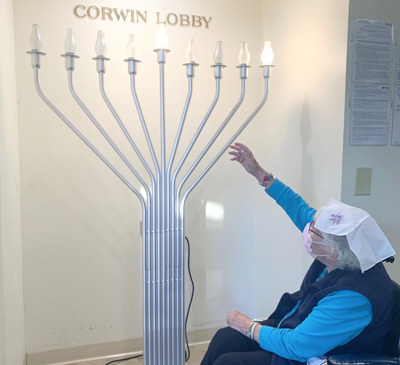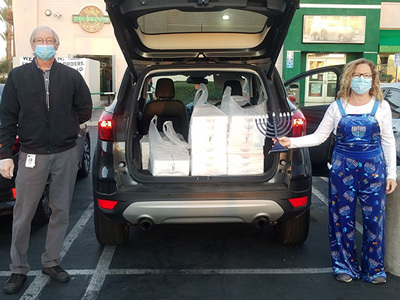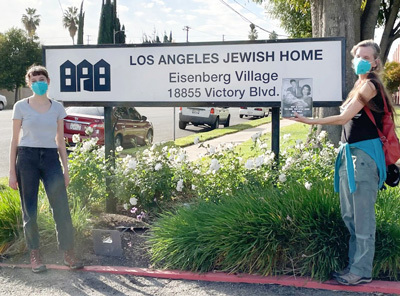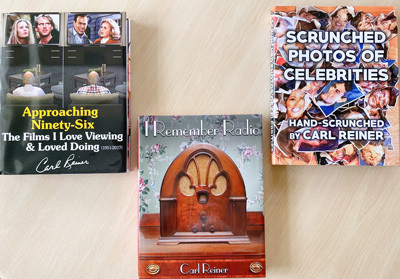Chanukah at the Jewish Home


Chanukah at the Jewish Home

Every winter, the glow of the Chanukah candles brings warmth, festivity and fun to the Jewish Home. This year, our menorahs will burn brighter than ever as we work to fill the halls of the Home with the tastes, smells and sounds of the holiday, rising above the challenges of the coronavirus pandemic and filling residents' lives with light.
The difficulties involved in staging a celebration right now, notes Rabbi Karen Bender, Skirball director of spiritual life at the Jewish Home, are clear. "As we began brainstorming about the holiday at the Home this year, we asked ourselves, 'In the era of COVID-19, how do we bring Chanukah alive?'" she recalls. The answer: "We focused on making those things we could do as wonderful as possible."
Those things include serving latkes to the residents at least three times during Chanukah's eight nights, hand-delivering Chanukah cookies and chocolate gelt to residents' rooms and providing dreidels for residents to spin. The Home will also be taking the tradition of sufganiyot (round jelly donuts) to a whole new level, Rabbi Bender says.

"My hat goes off to Rabbi Ron [Goldberg, campus rabbi of Eisenberg Village], who wanted to do something extra for our residents during such a trying year," she says. "He found a Krispy Kreme location that's kosher, tracked down its kosher license to ensure dietary appropriateness and then arranged for a big delivery of delicious jelly donuts. Our residents could really use some extra sweetness right about now!"
Plans for the holiday also include nightly broadcasts on the Jewish Home's in-house, closed-circuit TV station. "We'll be lighting candles and singing, making it fun and interactive," Rabbi Bender says. "On the second night, which is a Friday, we'll be marking Shabbat, as well. The great thing about it is that we can post our videos online, so residents can be watching at the same time as family members outside of the Home."
In preparation for Chanukah, Jewish Home staff have been busily decorating buildings across multiple campuses in blue and white, and as in previous years, the Home set up its giant, 10-foot-high menorah outside of Grancell Village.

Of course, part of what makes Chanukah special is receiving holiday greetings, and residents can look forward to receiving them courtesy of the Jewish Home's #Notes of Love campaign. The initiative encourages friends, relatives, and the public to send letters and cards to residents during the ongoing restrictions caused by COVID-19. There will also be presents, says Annette Weinberg, the Jewish Home's Eisenberg Village lifestyle and enrichment director for residential care. "We're grateful to our volunteer partners including the Home's own support groups: The Associates, The Executives, and The Guardians, as well as Our Space and Wilshire Boulevard Temple, who will be providing the gifts. And another volunteer is putting together do-it-yourself card-making kits, which residents can use to send Chanukah wishes to family members," she says.

One exciting bit of holiday cheer will come from the family of the late actor, director, comedian, screenwriter, and author Carl Reiner, who graciously donated books by Reiner to gift to each Jewish Home resident. The books include titles such as Approaching Ninety-Six: The Films I Love Viewing and Loved Doing, Scrunched Photos of Celebrities, I Remember Radio, and Why & When the Dick Van Dyke Show Was Born, and will be put into individual gift bags and given to residents with a personal message from Jewish Home President-CEO Dale Surowitz.
Rabbi Bender points out that Chanukah at the Jewish Home would not be Chanukah without also "bringing the silly," especially during a pandemic that keeps serious news front and center all the time. Finding opportunities to spark joy is always one of her central goals, and this year she plans to walk around the Jewish Home campus wearing a giant dreidel and menorah costume. "I like to do whatever I can to put a smile on our residents' faces," she laughs.